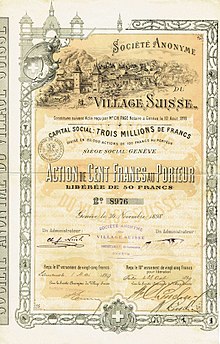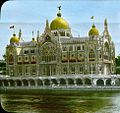World Exhibition Paris 1900
| World Exhibition Paris 1900 Exposition Universelle de 1900 |
|
|---|---|
 Panoramic view of the exhibition areas |
|
| motto | "Le bilan d'un siècle" |
| General | |
| Exhibition space | 216 ha |
| new hits | Escalator , film , photogravure |
| Number of visitors | 48.130.300 |
| BIE recognition | Yes |
| participation | |
| countries | 40 countries + 21 colonies |
| Exhibitors | 76,112 exhibitors |
| Place of issue | |
| place | Paris |
| terrain |
Champ de Mars , Trocadéro , Bois de Vincennes , Esplanade des Invalides Coordinates: 48 ° 51 ′ 22 ″ N , 2 ° 17 ′ 52 ″ E |
| calendar | |
| opening | April 15, 1900 |
| closure | November 12, 1900 |
| Chronological order | |
| predecessor | Brussels 1897 |
| successor | Buffalo 1901 |
The World Exhibition Paris 1900 ( fr: Exposition Universelle de 1900 ) was the fifth Paris World Exhibition . It took place from April 15, 1900 to November 12, 1900 and counted over 48 million visitors. This makes it one of the most successful exhibitions of its kind.
The Olympic Games , which lasted from May to October 1900 and attracted little attention, also took place as part of the world exhibition .
history
The total of 216 hectares of exhibition space at the World Exhibition of 1900 was divided roughly halfway between the Champ de Mars , the Esplanade des Invalides and the adjacent bank of the Seine (112 hectares) on the one hand and the Bois de Vincennes (104 hectares) on the other . The show was about ten times the size of the first Paris World Exhibition in 1855 . A total of 76,112 exhibitors were represented.
At the height of the Belle Époque , the official exhibition motto was: “A century's balance sheet”. The exhibition mainly left the Petit Palais and the Grand Palais as architectural heritage . Their attractions included large-scale projections by the Lumière brothers and the Rue de l'avenir ( Street of the Future ) - a wooden moving walkway ( pavement roulant or Plateforme mobile ) on which visitors could walk around the edge of the Paris exhibition grounds for 50 centimes. A diesel engine was also demonstrated, which, at the request of the French government, ran on peanut oil . A ferris wheel with a diameter of 100 meters on Avenue de Suffren existed until 1937.
In connection with the Expo, the Paris infrastructure was also modernized. The first line of the metro between Porte Maillot and Porte de Vincennes , which is still line 1 today , was opened on the national holiday , July 14, 1900, and the new train stations ( Gare d'Orsay , Gare des Invalides , Gare de Lyon ) improved the offer in long-distance transport. The new bridge, the Pont Alexandre III , symbol of the Franco-Russian alliance , was opened on April 14, 1900. On April 29, 1900, the bridge to the celestial sphere collapsed during the World's Fair. 9 people were killed.
An attraction of the world exhibition was the Village Suisse with an idealized representation of a Swiss village. The SA du Village Suisse was founded in 1898 to finance this village. Donors came mainly from the tourism industry. Parts of the Village Suisse can still be seen today.
The world exhibition was connected with the Olympic Summer Games in 1900 , which dragged on over the entire period. These Olympic Games were not a real event because of their lengthy duration. Only in 1904 were the Olympic Games, as originally requested by John Astley Cooper and Pierre de Coubertin , held together with world exhibitions.
The entrance fee was generally 1 franc , which in 2014 would be around € 7. In the early morning (8-10 a.m.) and evening hours (6-10 p.m.), 2 tickets had to be purchased.
Awards
Louis Scherf received the silver medal in the painting / porcelain plate painter category . Karl Strobach Senior received the large gold medal (ad personam) for cigarette papers from the Olleschau brand . The French steam car manufacturer Gardner-Serpollet received a gold medal for its new passenger car; the jury found their ease of use, comfort and performance to be superior to contemporary gasoline vehicles. The Pallenberg-Saal , manufactured by the Berlin artist Melchior Lechter on behalf of the owner of the Heinrich Pallenberg company , Jakob Pallenberg , was awarded a Grand Prix as a "spatial total work of art of Art Nouveau". The Plauen lace and, in the field of technology, the telegraphone by Danish inventor Valdemar Poulsen were also awarded a Grand Prix . Richard Riemerschmid received a gold medal for the interior decoration “Room of the Art Lover”. Rudolf Diesel received the Grand Prix for his diesel engine . Louis George Carpenter received a gold medal for his work in the field of irrigation technology.
The city of Ulm also received a silver medal for its workers' settlement Untere Bleiche . In summer 2019 it turned out that the whereabouts of this award is unclear.
State pavilions
German Empire (architect Johannes Radke )
Finland (architect Eliel Saarinen )
Austria (architect Ludwig Baumann )
Sweden (architect Ferdinand Boberg )
Individual evidence
- ↑ See also: The Paris World Exhibition of 1900 (p. 7). Appendix to the 15th edition of Baedeker's Paris , Karl Baedeker, Leipzig 1900.
- ↑ Various authors: Chronicle of the 20th Century . Ed .: Harenberg Verlag and Mediengesellschaft. 1st edition. No. 01322 7 . Bertelsmann, Gütersloh 1983, p. 13 (1247 pp.): “29th serious accident at the world exhibition in Paris. If the bridge to the celestial sphere collapses, nine people are killed. "
- ↑ Arnd Krüger : Neo-Olympism between nationalism and internationalism, in: Horst Ueberhorst (Hrsg.): Geschichte der Leibesübungen , Vol. 3/1, Berlin: Bartels & Wernitz 1980, 522-568.
- ^ The Paris World Exhibition of 1900 (p. 6). Appendix to the 15th edition of Baedekers Paris (as before).
- ↑ Old Masters en miniature - Thuringian porcelain plate painting, writings ... "Otto Ludwig" Museum Eisfeld, B1, 2011
- ↑ gazoline.com: Serpollet, à tout vapeur
- ↑ stadt-koeln.de : Speech by Lord Mayor Jürgen Roters on the occasion of the ceremony to mark the 125th anniversary of the Museum of Applied Art Cologne on June 10, 2013, 7 p.m., MAKK (PDF), accessed on August 9, 2015
- ^ Eduard Prüssen (linocuts), Werner Schäfke and Günter Henne (texts): Cologne heads . 1st edition. University and City Library, Cologne 2010, ISBN 978-3-931596-53-8 , pp. 54 .
- ^ Colorado State University, Libraries, Archives & Special Collections, “Guide to the Papers of Louis G. Carpenter,” prepared by Holley R. Lange; updated by Patricia J. Rettig, Biography, https://lib2.colostate.edu/archives/findingaids/water/wlgc.html
- ↑ World Exhibition Medal for Ulm disappeared without a trace. In: swr.de. August 9, 2019, accessed August 17, 2019 .
literature
- Winfried Kretschmer: History of the world exhibitions . Campus, 1999, ISBN 3-593-36273-2 .
- Erik Mattie: World's Fair . Belser, 1998, ISBN 3-7630-2358-5 .
- Otto N. Witt (Red.): World Exhibition in Paris 1900: official catalog of the exhibition of the German Reich. Self-published by the Reichskommissariat, Berlin; Stargardt, Berlin 1900. ( digitized version ).
- Georg Malkowsky (Red.): The Paris World Exhibition in words and pictures. Kirchhoff, Berlin 1900. ( digitized version ).
- Julius Meier-Graefe (Hrsg.): The World Exhibition in Paris 1900: with numerous photographs, colored art supplements and plans. Krüger, Paris / Leipzig 1900. ( digitized version ).
- Richard D. Mandell: Paris 1900, the great world's fair. University of Toronto, Toronto 1967.
- Iris Kronauer: On the fascination of technology. Electricity at the Paris World's Fair of 1900 and the judgment of German commentators. MA, TU Berlin, 1993.
- Iris Kronauer: Let there be light. In: Zeit , May 25, 2000 (online ).
Web links
- Overview in German ( Memento from July 23, 2014 in the Internet Archive )
- World Exhibition Paris 1900. Bureau International des Expositions (English). Retrieved March 23, 2017 .
- The 1900 World Exhibition in Paris (German)
- Photos and postcards
- Photos of the ferris wheel
- Paris Exposition of 1900 color photographs by photographer William Henry Goodyear (1846–1923), from the Brooklyn Museum.
- Virtual exhibition "Les expositions universelles à Paris 1867–1900" Bibliothèque nationale de France
- Edison historical footage of Expo 1900
- contemporary illustrated book
- gazoline.com: Serpollet, à tout vapeur (French) (accessed April 16, 2014)













